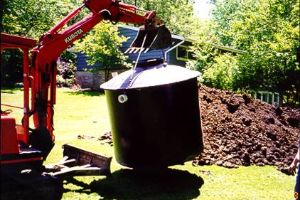| 2 | 3 | |
|---|---|---|
For an Appointment or Information Call |
||
(216) 201-2000 ext. 1266 mconklin@ccbh.net |
(216) 201-2000 ext. 1239 nmcconoughey@ccbh.net |
|
The Cuyahoga County Board of Health (CCBH) conducts a diverse Sewage Treatment System Program which addresses water quality issues within the county. A total of 48 communities in the Cuyahoga County General Health District have residences that use household sewage treatment systems. A map showing the distribution of these sewage systems throughout the County is available by clicking the link.
Nearly 11,000 of these systems are currently in use throughout these communities. The number of sewage systems in each community ranges from one to over 1,300. Household sewage treatment systems are needed to treat wastewater in areas that are not accessible to a sanitary sewer. Many of these existing systems, because of their age or antiquated design, may not be capable of properly treating sewage.

CCBH permits and inspects the installation of new sewage treatment systems. Under the Operation and Management Program, our staff also conducts inspections of sewage systems currently in use. An Application For Household Sewage System Evaluation should be completed and submitted to the Board of Health to schedule an inspection. We likewise ensure appropriate Sewage System Abandonment when a system is being taken out of use.
Sewage system haulers, installers and service providers are registered by the Board of Health. Our staff also conducts site reviews of undeveloped property to identify the potential for the installation of sewage treatment systems.
The Board of Health works closely with local community leaders as they determine their future sewage needs. The Board of Health also works with many other local, state and federal entities on issues pertaining to sewage disposal and water quality.
Statewide Sewage Treatment System Rule Update
The most recent statewide sewage rule making process began in 2011 and lasted almost three years. Some of the more significant changes in these rules were made to offer local health districts the ability to be somewhat flexible when establishing certain parameters. Local health departments throughout Ohio were required to rescind any local sewage program rules and adopt the new statewide rules. The Ohio Department of Health (ODH) also required boards of health to act on certain items within these rules. To help simplify this process, CCBH has created a Supplement to the Ohio Department of Health Sewage Treatment System (STS) Rules – Ohio Administrative Code Chapter 3701-29, which regulate household and small flow sewage systems.
The most significant differences/additions in the state rules that impact locally established sewage programs addressed the following topics:
- Registration of installers, service providers and septage haulers – state testing & bonding with local registration and requirements for continuing education.
- Allowance of homeowners to service and install their own HSTS with limited registration requirements.
- Provisions in law and rules for the design, installation and permitting of gray water recycling systems (GWRS).
- Allowance of local health department sanitarians to potentially conduct soil evaluations.
- Development of a phased operation & maintenance management program for all STS throughout Ohio, requirements for length and cost of permits and provisions required for service of these systems.
- Establishment of a vertical separation distance from the sewage effluent to the limiting condition of seasonal water which can be no more than 18 inches.
- Establishment of an “in situ” soil requirement, which is the amount of unsaturated native soil.
- Provision for the use of interceptor, perimeter and engineered drainage to depress the seasonal water table and create a subsurface gradient to improve site drainage.
- Provision for establishing household sewage treatment districts.
- Provision for establishing land application rules and prohibitions for septage.
These new rules allow for the use of a wide variety of sewage systems and require local health departments around the State of Ohio to address sewage system operation, maintenance and management. They will no longer be able to approve system installations and then walk away from the property with no regard to how the system functions in the future.



